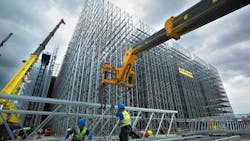Supreme Court Refuses to Hear Challenge to Trump's Steel Tariffs
The U.S. Supreme Court refused to question President Donald Trump’s imposition of more than $4 billion in steel tariffs, turning away an appeal that challenged his use of national security as the legal justification for his trade agenda.
The appeal by a steel industry trade group and two of its members contended that the provision Trump invoked, known as Section 232, gives the president such broad discretion to impose tariffs on national security grounds that it violates the Constitution. The Supreme Court made no comment in refusing to hear the case.
“Section 232 essentially turns over to the president the entirety of Congress’s constitutional power to impose tariffs and other restrictions on imports,” the American Institute for International Steel argued in urging the court to take up the case.
Trump imposed the 25% steel tariff, along with a 10% duty on aluminum imports, in March 2018. Some countries, including Brazil and South Korea, have negotiated deals to avoid the tariff, and Trump this year dropped the duty for imports from Canada and Mexico. But the tariffs still apply for much of the world, including the European Union, China and Japan.
Trump is now threatening to invoke Section 232 to place tariffs on imported automobiles and parts.
The Trump administration urged the justices to reject the appeal, saying that “common sense and the inherent necessities of governmental coordination support a grant of discretion to the president” when it comes to national security.
The Supreme Court upheld Section 232 in 1976, saying it gives sufficient guidance to the president to pass constitutional muster.
The steel-industry trade group took the unusual step of asking the Supreme Court to directly review a ruling by the Court of International Trade and bypass the federal appeals court level. The Supreme Court rarely takes federal cases without an appeals court ruling.
Alan Morrison, the lawyer for the American Institute for International Steel, said the trade group would keep pressing its case at the U.S. Court of Appeals for the Federal Circuit in Washington.
“We are disappointed that the Supreme Court did not agree to hear this case now, but we will continue our efforts in the Federal Circuit to have section 232 declared unconstitutional,” Morrison said in an email. “Once the Federal Circuit has spoken, we expect that the losing party will ask the Supreme Court to review that decision.”
The Justice Department declined to comment.
About the Author
Bloomberg
Licensed content from Bloomberg, copyright 2016.
